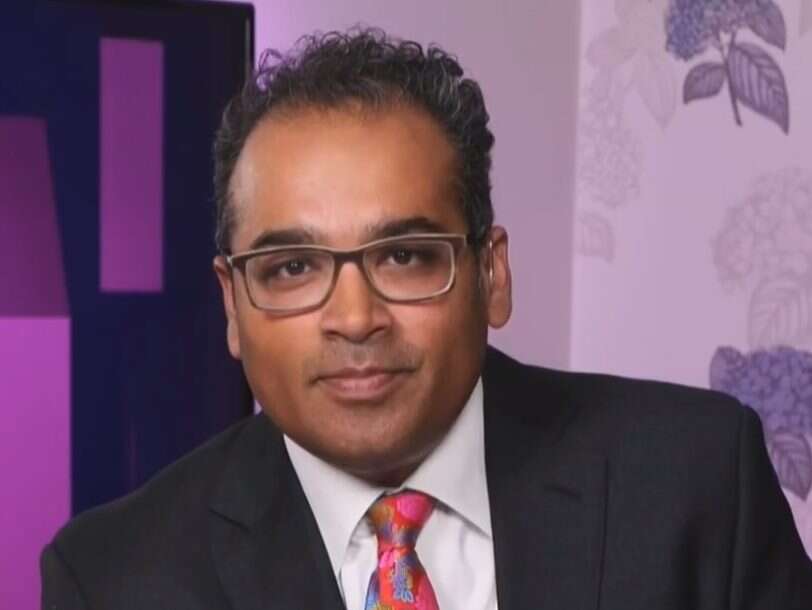
Channel 4 News presenter Krishnan Guru-Murthy answers Press Gazette’s questions about life, work and the news industry during lockdown.
How have you been keeping happy and healthy during lockdown?
I’ve been drinking vast amounts of red wine and discovered I quite like gin. But they only make me momentarily happy and not at all healthy. So I’ve been cycling a lot, training for my 300km in 24-hours ride to raise money for Duchenne UK in the #DuchenneDashAtHome.
I’ve also started running and lost 10kg and that makes me quite happy. And when that doesn’t work I’ve finally got my home music studio up and running and I’m playing a fair amount of music.
What have been the biggest challenges of reporting/presenting during lockdown?
It’s been really exciting for a gadget geek like me setting up small cameras at home, with prompting and monitors and sending my signal out over broadband. The challenge is to leave yourself the headspace for the normal editorial thinking. I record my podcast too now from my study.
In reporting terms it has been easier to get hold of people because they have been at home. But I really miss being out on the road, seeing people’s problems for myself and talking face-to-face. I also really miss the foreign travel. It has felt quite inward looking at times for a global pandemic.
What pandemic stories are you most proud of at Channel 4 News and why?
We have brilliant experts at C4 News. Our Health and Social Care Editor Victoria Macdonald has been ahead of the story, scrutinising the key decisions and their timing from the start. Darshna Soni has helped reveal the disproportionate impact on people from ethnic minorities.
Early on I started work on a documentary comparing the British and South Korean responses on testing and tracing on which turned out to be right on the button. On C4 News we’ve focused on testing, the early scientific warnings and whether government policy has made sense. Our investigations team revealed the scandal over out of date PPE in the NHS.
Waad Al Kateab, who famously filmed hospitals in Aleppo for us, found herself making some brilliant tear-jerking films in British hospitals with Covid survivors. That’s all made us a place experts, health workers and families have wanted to be interviewed and a place government ministers want to avoid. That’s bad for public accountability, but we think it’s because we are asking the right questions.
Which other news outlets have most impressed you with their pandemic coverage and why?
I think the FT have done brilliant public service with their data analysis on things like the number of excess deaths. The Guardian coverage has been consistently good with some great revelations and columns from Devi Sridhar. BBC Panorama has given my colleagues at C4 Dispatches some healthy competition, but both have been very strong and showed how vital they are. Stuart Ramsay did some really moving stuff in Italy for Sky News.
On the whole I wish more outlets had seen this as a story in which health and science editors were the ones leading the coverage and scrutinising the government.
How do you see the future of broadcast journalism (and the wider industry) after the Covid-19 crisis?
I think the pandemic has been a time in which the public has really valued honest public service journalism and broadcasting, especially after the poisonous atmosphere of Brexit coverage and the associated attacks on the media. So I think it has strengthened our bond with viewers and made it even clearer to them that we can give them a voice and that politicians must be accessible, answer questions and be held accountable.
I think it has probably made people see the value of trusted public service broadcasters again and banish any idea of dismantling them. Those people who struggle to maintain TV subscriptions as the financial impact of the pandemic plays out will value free-to-air broadcasters even more.
Those of us who are commercially funded will face financial challenges as the country heads into recession, but it is too early to know the long term extent of the damage.
What are your thoughts on diversity within the news industry, which is again in the spotlight?
It has been a truly exceptional and profound experience watching the reaction to the killing of George Floyd. People at every level have looked around them and finally started to understand the problems racism in the media and a lack of diversity bring. It makes you unable to properly cover a diverse country or seem relevant to viewers.
I have struggled to watch with disbelief as we have been served up with a procession of mostly white journalists talking about black people. All broadcasters are failing badly to find, retain, develop and promote diverse talent. I’ve spent decades asking where are the black and Asian editors, channel heads and chief executives?
However easy it is to cover up with a few brown faces on air there are very few senior people in this industry from diverse backgrounds. The pay gaps are scandalous. The way minority journalists feel excluded and not listened to is tragic. We need commitments to radical change and rapid delivery linked directly to the remuneration of bosses.
Read all Press Gazette’s coverage of the coronavirus pandemic and the news industry here.
Picture: Channel 4 News
Email pged@pressgazette.co.uk to point out mistakes, provide story tips or send in a letter for publication on our "Letters Page" blog
